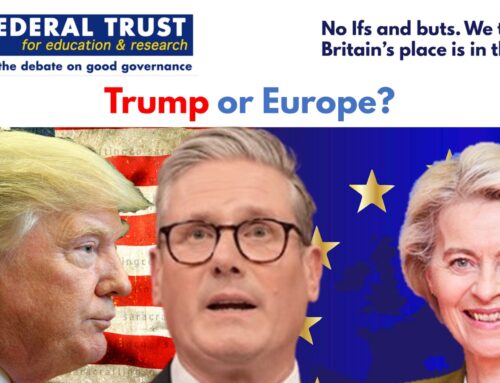
by Dr Andrew Blick
Reader in Politics and Contemporary History at King’s College London; Senior Research Fellow at the Federal Trust
14th February 2020
Criticism of the European Union in United Kingdom (UK) political discourse has often focused upon the proposition that as a project it is federal in nature. For this reason, according to such theses, membership has always been incompatible with UK constitutional traditions, and poses an unwelcome threat to the integrity of the UK as an autonomous ‘sovereign’ state. It is in its response to such assertions that the supposed pro-European movement committed what was perhaps its fundamental error. Representatives of the mainstream integrationist side of the argument allowed themselves to be imprisoned by the logic that flowed from acceptance of the premise that, from a UK perspective, the undesirability of federalism was axiomatic. Rather than challenge this presumption, the typical retort was to claim that the European Union (EU) (or its predecessors) was not federal in nature; or that any tendencies in this direction could be diluted or mitigated, and that UK membership was therefore – at least on balance – desirable.
The problems with this approach are numerous. They conceded ground to anti-Europeans, by accepting that, if it could be established the EU was a federal entity, then participation was indeed a problem. A supposed defence of membership that rested on the idea that such tendencies were indeed present in the EU but could be contained was on particularly weak ground. The central defect of pro-EU rhetoric in the UK – conveying a tone that the project, rather than being a good in itself, was not as bad as those who disliked it claimed – can be traced to this error. This flawed approach made a substantial contribution to the calamitous defeats for the UK European integration movement of 2016-2020.
The fundamental reason that promoting the EU in this way was mistaken – aside from its defensive, negative character – was the nature of the claim on which it rested. Those who took up this line sought to persuade that the EU was either not federal in nature at all, or at least that such tendencies within it could be minimised. The problem was that the Eurosceptic claim that European integration was a federal project had substance to it.
The EU as it has developed has many features of a federal state (though that is not the same as to argue that it has fully taken on this character). It is made up of multiple territorial components and a central group of authorities. There is a principle – subsidiarity – for discerning the proper apportionment of powers between the centre and the territories, emphasising their dispersal rather than concentration. The EU has an elected Parliament at the centre with the ability to scrutinise the executive, approve appointments to it, and which has a defined role in the law-making process. Another institution at the equivalent to the ‘federal’ level, the Council of Ministers, is made up of the governments of the territorial members, the equivalent to the ‘states’. An executive develops legislative proposals subject to approval from the Council and the Parliament. The legislation produced by this process, dealing with matters within the competence of these institutions, applies as European law throughout the Union, taking precedence over law of domestic origin within the member states. A ‘federal’ court, the Court of Justice of the European Union, is the final interpreter of European law. The European Charter of Fundamental Rights performs a role similar to a Bill of Rights in a federal system; and the treaties making up the EU comprise, in the same sense, its constitution (though efforts formally to establish an EU constitution have met with obstacles).
The EU has a central bank; and 19 of its 27 members now participate in the single currency. It operates uniform external tariffs – making up the European Customs Union – and has a Single European Market – both features one might associate with a single federal state. There are ‘federal’ policies in a range of important areas – such as the environment, commercial and social regulation, agriculture, and internal and external migration. But at the same time – as one might expect of a federal system – the territorial ‘states’ that make up the federation have significant discretion to pursue social, economic, welfare and cultural policies determined in accordance with their own democratic arrangements, provided they do not compromise the integrity of the whole.
The EU has developed this combination of features over time. Those who sought to defend the project by denying or downplaying its federal aspects have therefore had an increasingly hard task to perform. The general direction of travel has undermined their narrative. But the problem such exponents of non-federal European integration is more-deep seated. Without doubt, the European project has made immense progress in the post-Second World War era. Yet those who – around the middle of the twentieth century – provided important political and intellectual impetus for European integration saw such potential in their project even before its instigation. From this point of view, the EU was, from the outset, inherently federal. To deny this quality is either dishonest or misinformed. The attempted negation of reality is sometimes deployed as a political campaigning device, and it is a fashionable technique at present. It may, in some circumstances, achieve short term political success. But it is less viable over the long run as a basis for a movement to shape the orientation of a state, and is likely – as in the present case – to be self-defeating. To oppose federalism is, in effect, to oppose EU membership.
It is now difficult for those who wish to see the UK rejoin the EU to argue that the previous rhetorical approach of most pro-European organisations in the UK was successful. Nonetheless, some advocate the maintenance or even intensification of the existing techniques. They might seek to hold, variously, that the EU was never as federal as its opponents claimed; that it is becoming less so; or that the UK, by re-entering, can ensure that such tendencies are restrained. There is no reason to suppose that such claims, which failed to prevent UK exit from the EU, will be any more suitable for the possibly even more challenging task of securing membership once more.
What platform might supporters of re-entry establish? It might start from a recognition of the true nature of the EU. It should recognise it is founded in a project that has always been federal in nature, whether or not those associated with it have realised, or been willing, to acknowledge this fact. This quality is not inimical to UK constitutional traditions. Indeed, as is well known in some circles in this country but not beyond, the UK has a powerful historical federal tendency. It has provided some important contributions to federal thought; and been involved in different ways in numerous practical applications of the federal concept, from Canada to India to Germany to Australia (and, indeed, the United States, the founders of which sought to apply chosen principles derived from a UK heritage). The existing European integration project found early impetus from thinkers and campaigners based in the UK, associated with Federal Union in its early days. While the UK has not fully applied a federal system to itself, the idea of doing so has at times figured in political debate. Furthermore, since the late 1990s, and especially as a consequence of the introduction of devolution to Wales, Scotland and Northern Ireland, it has increasingly taken on federal characteristics for its internal arrangements. It is possible that it will continue to develop in this direction in future.
A pro-federal form of European advocacy could stress that those aspects of the EU that are most effective and valuable came about through the organisation fulfilling its federal qualities. The protection of rights through the Charter, for instance, fits within this category; as does the elected European Parliament through which European citizens can achieve a democratic input into the composition of the EU central apparatus. The Single Market, first brought into being partly at the instigation of Margaret Thatcher, is critical to the effectiveness – and unique nature – of the EU. Though they may resist having to abide by its rules, UK policy-makers clearly see value in the Market, since they hope (whether realistically or otherwise) to maximise access to it through a post-Brexit EU-UK Free Trade Agreement. The robust support the EU has provided to the Republic of Ireland during the Brexit process might be seen as indicative of an entity in which the diverse parts are nonetheless part of an integrated whole, as one would expect in a federation more than a looser association of independent states.
Conversely, those areas where the EU has performed less well – for instance, its lack of a mutualised debt; or its difficulties in developing a unified external policy – are attributable precisely to its not having achieved more extensive progress towards federation. Its difficulties in managing large scale inward migration are similarly the outcome of not handling the issue more clearly at a pan-EU level. Furthermore, the troubling movement away from liberal values in member states in the East could be seen as suggesting that the more effective application of federal-type constitutional principles is required.
Those who wish to campaign for UK membership of the EU, then, might consider reversing the stance often taken within their movement. Rather than conceding the idea that federalism is a problem for the UK and that the EU only has merit in as far as it does not adhere to such a model, they could actively present federalism as compatible with UK traditions, and lying at the core of the EU as a successful and worthwhile venture. In such accounts, the UK could re-join with a view to accelerating rather than resisting this process. Anti-Europeans were successful in contaminating the concept of federalism in the face of logic and rationality. Similarly determined action for the opposite cause might be a means of turning their weapon against them.





